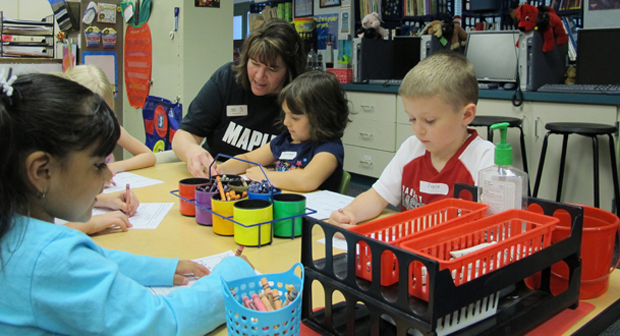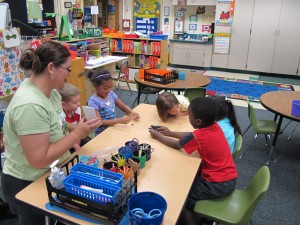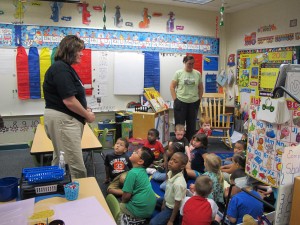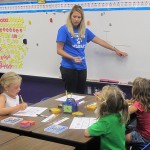How Indiana's Youngest Students Are Preparing For All-Day Kindergarten

Elle Moxley / StateImpact Indiana
Teacher Janet Craig helps students identify colors during at pre-kindergarten camp at Maple Elementary in Avon, Ind. United Way funds the camp, which is staffed by local teachers and volunteers from the Indiana University Health system.
For the first time this fall, every Indiana kid can attend a full day of kindergarten on the state’s dime. The General Assembly approved $80 million in funding for all-day kindergarten in April. Before, families had to qualify for federal funding or pay tuition if they wanted their child to attend an all day program.
But because Indiana doesn’t fund early childhood education, many students will start school in the fall having never set foot in a classroom. Without preschool, the transition to a full day of class can be challenging for students who aren’t prepared for kindergarten academics.
- Why Kindergarten Isn't Just Playtime And Pasta CraftsStateImpact Indiana’s Elle Moxley looks at how a United Way-funded summer camp is helping 4- and 5-year-olds in Avon get ready for all-day kindergarten.Download
“They’ve maybe never picked up a pencil or they’ve never colored with a crayon or never had someone read a book to them,” said Janet Craig, who teaches kindergarten at Maple Elementary in Avon.
So for the second year in a row, Craig is giving up part of her summer to work with disadvantaged students at a United Way-funded kindergarten camp that’s run through Indiana University Health. The four week camp is chance to review shapes and colors, learn letters and numbers, even to begin spelling — everything they need to get caught up to their peers.
Why Kindergarten Is The New First Grade
Craig says most kindergarteners leave her classroom at the end of the year able to read at grade level or above. Schools didn’t always emphasize literary skills so early, but Craig says that’s changed as Indiana has adopted more rigorous academic standards. With Indiana schools already adopting new national standards in the early grades, students who can’t read when they leave kindergarten are already behind.
—Janet Craig, kindergarten teacher
“Kindergarten teachers say kindergarten is what first grade used to be,” Craig said. “So I think having a nice background in letters and sounds and how to write your name and knowing your colors and shapes, you can start doing many more things with them than you could when kindergarten was just shapes and colors.”
For the kids who aren’t ready, schools and communities are trying to intervene earlier. About 350 kids across the state are participating in a United Way kindergarten program this summer. In Avon, the district identified 21 4- and 5-year-olds who could benefit from extra time in the classroom. Craig and a team of volunteers sing songs that teach basic literary skills. They have to remind the students to color within the lines and not scribble all over their papers.
“I continue to be amazed at how basic some of the things the kids come into this program needing,” said Cathy Stoll, director of marketing and community outreach at IU Health West. The hospital sends volunteers to Maple Elementary every day in June for kindergarten camp. “You think about going into kindergarten, if they didn’t have that, how far behind they might feel.”

Elle Moxley / StateImpact Indiana
Maple Elementary outdoor learning coordinator Jennifer Davies plays a counting game with a small group of students at kindergarten camp. She has to switch to Spanish during the lesson to help a student understand.
Uno, Dos, Tres
Craig asks the students to take a break from coloring strawberries to look at their crayons. They’ve been singing a spelling song all morning, so she asks them if they can find the r-e-d word on the wrapper. One little girl just blinks.
“I even see it in Spanish, Chelsea. Rojo. I see it in Spanish,” says Craig.
During a counting exercise, a volunteer points to plastic ants. “Uno. Dos. Tres.”
At least three students at the camp speak little or no English. Craig says it’s her job to make sure they have success anyway, no matter what experiences they bring to the classroom. Four weeks won’t be enough time to get them caught up to their peers, some of whom have had months and even years of early childhood education.
But it’s a start. Just learning the structure of a school day can make a huge difference for a kid who’s been at home all day with Mom or Dad or Grandma, Craig says. They start school in August knowing how to walk in a line, to be quiet in the halls and to get lunch in the cafeteria.
—Renee Moore, kindergarten teacher
“On the first day of camp, one little boy just got up to use the bathroom. He didn’t know he couldn’t do that at school,” said kindergarten teacher Renee Moore.
Moore, who works with Craig at Maple Elementary, says she likes to spend time at camp helping students learn to write their names — a skill most teachers just won’t have time to teach in a classroom of 25 kids.
No More Milk And Cookies
It’s not just kindergarten teachers who say school is becoming more academic in lower grades. Terry Spradlin, the associate director of the Center for Evaluation and Education Policy at Indiana University, says it’s not just milk and cookies and naps anymore in kindergarten classrooms.
“The most important thing they emphasize are the development of literary skills,” said Spradlin. “Vocabulary, speech, some basic writing skills, et cetera are starting to be developed in those early months of kindergarten.”
Developmentally, children are ready to begin intensive learning at 5 — research has shown that a young child’s brain is more than twice as active as an adult’s, Spradlin says. But he says it will take more early education funding from the state to get disadvantaged students caught up to their peers. All-day kindergarten is a start because it provides more time on task for kids who need extra help.
Statewide numbers aren’t in yet, but districts are reporting an uptick in all-day kindergarten enrollment. In Avon, full-day enrollment is up more than 40 percent from last year.
Spradlin says there’s still a chance that the switch to all-day kindergarten won’t be permanent. Instead of changing the school funding formula to give districts more dollars for kindergarteners, the legislature is distributing the money as part of a grant program that will have to be renewed in two years.
Districts applying for the grant can’t charge families kindergarten tuition. Spradlin says it’s possible that a district might decide not to take the grant and continue charging families, but he doesn’t think it’s likely.
Planting The Seeds Of Knowledge
Craig says most families are receptive when the district invites them to participate in kindergarten camp — parents want what’s best for their kids.

Elle Moxley / StateImpact Indiana
Janet Craig, left, and Jennifer Davies talk to the pre-kindergarten students about the importance of being quiet in the hallway at school.
Parent Juanita Broadnax learned about the program through her older children’s school. Five-year-old Elijah has three older sisters and a younger brother. Broadnax says he’s energetic, loves to sing and make music. She says a similar program helped his sisters start school when the family was living in North Carolina.
“He told me the first day, ‘Mom, I’m nervous!’ But now he’s loving it,” Broadnax said. “He’s making new friends, coming home, telling me what he learned. I say, ‘What did you learn yesterday?’ He says, ‘Mom, I learned about seeds. I asked, ‘What do seeds do?’ ‘You plant the seed, you water it, it grows.’”
Craig says seeds are a good analogy for how kids grow and change in the first four weeks of kindergarten camp. Some students cry on the first day. But last year, the first year for the camp in Avon, Craig says she and Moore were surprised by how many hugs they received on the last day. These kids leave ready, she says, for their very first day of school in August.
“I think for these kids, they’ll become leaders in their classrooms because they’ve already gone through four weeks of camp that is like kindergarten,” she said.
Podcast: Play in new window | Download

